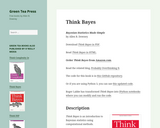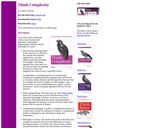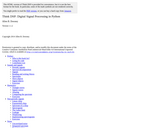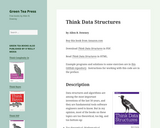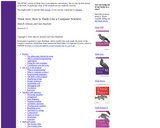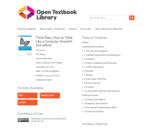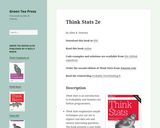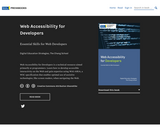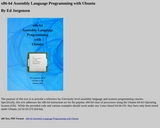Data structures and algorithms are among the most important inventions of the last 50 years, and they are fundamental tools software engineers need to know. But in my opinion, most of the books on these topics are too theoretical, too big, and too bottom-up:
*Too theoretical: Mathematical analysis of algorithms is based on simplifying assumptions that limit its usefulness in practice. Many presentations of this topic gloss over the simplifications and focus on the math. In this book I present the most practical subset of this material and eliminate the rest.
*Too big: Most books on these topics are at least 500 pages, and some are more than 1000. By focusing on the topics I think are most useful for software engineers, I kept this book under 250 pages.
*Too bottom-up: Many data structures books focus on how data structures work (the implementations), with less about how to use them (the interfaces). In this book, I go “top down”, starting with the interfaces. Readers learn to use the structures in the Java Collections Framework before getting into the details of how they work.
Finally, many present this material out of context and without motivation: it’s just one damn data structure after another!
I try to alleviate the boredom by organizing the topics around an application—web search—that uses data structures extensively, and is an interesting and important topic in its own right.
This application also motivates some topics that are not usually covered in an introductory data structures class, including persistent data structures, with Redis, and streaming algorithms.
I have made difficult decisions about what to leave out, but I have made some compromises. I include a few topics that most readers will never use, but that they might be expected to know, possibly in a technical interview. For these topics, I present both the conventional wisdom as well as my reasons to be skeptical.
This book also presents basic aspects of software engineering practice, including version control and unit testing. Each chapter ends with an exercise that allows readers to apply what they have learned. Each exercise includes automated tests that check the solution. And for most exercises, I present my solution at the beginning of the next chapter.
This book is intended for college students in computer science and related fields, as well as professional software engineers, people training in software engineering, and people preparing for technical interviews.
I assume that the reader knows Java at an intermediate level, but I explain some Java features along the way, and provide pointers to supplementary material.
People who have read Think Java or Head First Java are prepared for this book.
